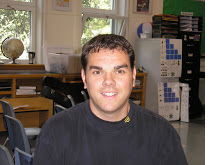
The NEA Foundation today named Thomas Young, of Duxbury, a first- and second-grade teacher at Waitsfield Elementary School, as a 2013 Pearson Foundation Global Learning Fellow. With this honor, Young joins a class of 36 award-winning public school educators who will spend a year building their global competency skills, or the capacity and disposition to understand and act on issues of global significance.
“In order for students to be prepared for the global age, their educators must be equipped with the knowledge, skills and disposition to teach in the global age,” said Harriet Sanford, resident and CEO of the NEA Foundation. “Our Global Learning Fellows program has an intentional focus on supporting educators as they strengthen their global competencies: investigating the world beyond one’s immediate environment; recognizing multiple perspectives; communicating ideas effectively with diverse audiences; and taking action to improve conditions.”
The fellowship expands on the NEA Foundation’s mission to advance student achievement by investing in public education that will prepare all students to learn and thrive in a rapidly changing world. It is designed to help educators, all recipients of the NEA Foundation’s Award for Teaching Excellence, acquire the necessary skills to integrate global competence into their daily classroom instruction, advance pedagogy in their school/district, prepare students to thrive in the interconnected global age, and thus contribute to the closing of the global achievement gap.
The fellowship builds a structured and collaborative learning experience that supports educators as they acquire global competence skills. Over the course of one year, fellows are supported by the NEA Foundation staff, partners, and other field experts, as they work through the following:
- 1. Readings and webinars to introduce global competence and country specific concepts;
- 2. Online coursework on global competence, country specific concepts, and interactive language learning;
- 3. A two-day professional development workshop with sessions led by leaders in global competency and country-specific knowledge; and
- 4. A study-tour designed to focus on the themes of global competence, education (both practice and issues of international, national, and state policy) and economics.
The tour of Brazil, from June 19 through 27, includes visits to schools in São Paulo and Rio de Janeiro to provide educators with structured opportunities to observe high-quality instruction and to interact with Brazilian teachers and administrators. It also includes opportunities to investigate Brazil’s historical and cultural significance.
In preparation, the fellows will complete an online course to provide them with a framework to contextualize their experiences in Brazil by examining the impact of its historical and cultural legacies on contemporary Brazilian society and educational system.
The NEA Foundation has also partnered with Rosetta Stone to provide fellows with basic Portuguese language training. “As we know, language is the road map to other cultures and is therefore an important tool for building global understanding,” Sanford said.
At the conclusion of the Pearson Foundation Global Learning Fellowship, educators begin working on a final project to create a lesson plan, unit plan, or full curriculum integerated with global competency skills. By creating this plan, and then sharing with educators around the world via an open source platform, fellows are contributing to an increasing field of knowledge on this topic. Furthermore, the fellows become positioned to lead the profession by becoming advocates for global learning and global competence within their schools, communities and districts.






